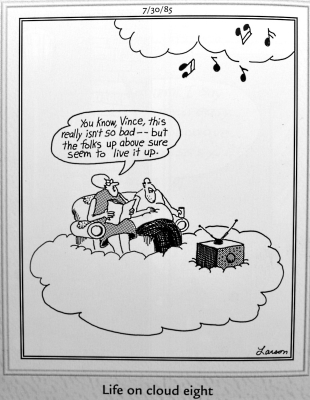 One of my projects, before I move, is to go through my Complete Far Side and photograph all the best ones. Yesterday I saw this one, "Life on cloud eight", which fits right in with the last post.
One of my projects, before I move, is to go through my Complete Far Side and photograph all the best ones. Yesterday I saw this one, "Life on cloud eight", which fits right in with the last post.I've heard it said, if you can enjoy being in hell, you're in heaven. But some of us don't even have to enjoy being in hell -- we just have to appreciate second-rate heaven.
More explicitly: whether you're talking about making more money, or having more fun, or being a better person, there's always a way to reach the next level. But the higher you get, the harder it is to stay there, and the more likely you are to notice: the good feeling of achieving a higher level is less than the bad feeling of not being satisfied with the level you're at.
This helps explain a cryptic line I read years ago in a Cynthia Ozick story: "Heaven is for those who have already been there." It also seems vaguely related to a cryptic line I read the other day in this Reddit thread: "Life does not give a rat's ass who lives it."]]>
 Fun stuff for the weekend. Yesterday I saw this on TV and jumped out of my seat to snap a pic. It has to be accidental, because if she tried to do it on purpose it wouldn't be this perfect. If you want to look closer, here's a larger photo. (And that's not a green screen behind her. I saw from another angle that they were at the actual event.)
Fun stuff for the weekend. Yesterday I saw this on TV and jumped out of my seat to snap a pic. It has to be accidental, because if she tried to do it on purpose it wouldn't be this perfect. If you want to look closer, here's a larger photo. (And that's not a green screen behind her. I saw from another angle that they were at the actual event.)